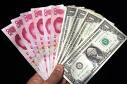 There are enough headlines that U.S. dollar has weakened against almost all major currencies in the last few years, and it is certainly not good news for everyone making a living in the States -- higher price for imported products, more expensive overseas vacation, etc. As a U.S. taxpayer who lives in China, however, I am facing a different flavor of the challenge:
There are enough headlines that U.S. dollar has weakened against almost all major currencies in the last few years, and it is certainly not good news for everyone making a living in the States -- higher price for imported products, more expensive overseas vacation, etc. As a U.S. taxpayer who lives in China, however, I am facing a different flavor of the challenge:
On one side, since most of my compensation package is now mostly denominated in Chinese Yuan, without doing anything, my salary expressed in U.S. dollar will receive automatic increase. This certainly serves me well when I reported my monthly net worth in dollar terms.
On the other hand, since most of my portfolio is sitting in U.S. accounts, and most of my spending is in China and more likely than not we will spend a good part of our golden years in this side of the Pacific, we do worry about our future purchase power in the local currency.
A quick dose of history: for a longer period before July 2005, the Chinese government mandates a Chinese Yuan's peg to the US Dollar at a rate of 1 dollar = 8.27 yuan. The peg was lifted in July 2005 with an immediate adjustment to 1:8.11, and while the government still dictates the exchange rate, it has been gradually inflating the Yuan. In the twelve months in 2006, Chinese Yuan gained 3.5% against the dollar. So far in 2007, Yuan gained another 5.5%. Given the mounting pressure from U.S. and Europe complaining China is selling its products too cheap (have you complained that Walmart is selling things too cheap before?), it is rumored but widely believed that Yuan will gain another 7-8% in 2008.
So how should I respond to the challenge?
One thing I am already doing is to increase the exposure of international equity in my portfolio. While most personal finance literatures suggest 20-25% foreign equity exposure in aggressive portfolios, my portfolio already has 35% of its value invested in mutual funds specialized in foreign stock markets.
But there might be a simpler option: move my money to China and buy local money market fund. After five interest rate hikes so far this year, currently money market funds are yielding about 3%. Adding the 7-8% expected currency gain in 2008, we are talking about 10% gain in dollar terms with almost zero risk, which is seemingly more attractive than U.S. equity investment opportunities on a risk-adjusted basis. Better, one does not have to pay tax on either the mutual fund dividends nor the currency gains (China does not assess capita gain tax from individuals).
It appears to me that as a first step, a rational choice will be to at least move majority of my cash balance to Chinese money market funds, and expect an almost risk-free return of 10% or more in dollar.
No wonder the "hot money" in China is piling up every day!
What do you think of this idea?
